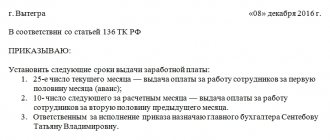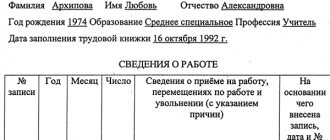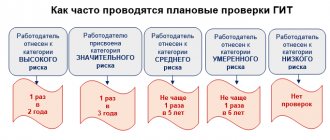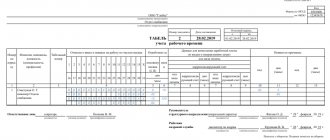18.06.2019
0
324
5 minutes.
When employed, each employee is required to perform certain duties in accordance with his position. They are usually specified in an individual contract or additional agreement. But due to production needs or other prerequisites, it may be necessary to change labor functions. Both parties should know how to correctly carry out and record these transformations, whether the employee’s consent is important for this, and in what order to dismiss if he categorically refuses to work according to the new rules.
For what reasons can a change in an employee’s job function be made?
An enterprise can change the direction of its activities or carry out reorganization measures - in both cases, the labor obligations of employees are affected. And then management makes changes to the records of the labor functions of subordinates, although this is almost always a formality. The reasons for such events may be the following:
| Reason for changing job function | Details |
| New job responsibilities | The position does not always correspond to the profession. The labor function is the main obligations of the profession. Job responsibilities are an additional list of employee responsibilities. An example is an accountant (general accounting). Accounting is a profession, and the employee must keep accounts. But an accountant performs the following job responsibilities:
If an employee transfers to new job responsibilities, the job function changes, and a record of this is made in the employment contract. |
| Medical indications | It happens that an employee’s poor health forces him to agree to a demotion or a reduction in the list of responsibilities. The employer, before transferring a subordinate to another position, is obliged to agree on this point with the worker. If management has nothing to offer in such a situation, or the employee himself refuses to move to a new position, the employment relationship is terminated. If an employee is sick at the moment, but his health will recover over time and he will be able to return to his usual duties, he can be released on leave without pay. |
| Temporary job | Job responsibilities may be changed as a result of the employee’s temporary transfer to another location. For example, you need to replace a subordinate who is on vacation. And then (even if the positions are similar) job functions can still change. An example is a sausage shop. One employee packs the sausage, monitors the expiration date and sells it, while the second is solely engaged in sales. If the first employee goes on vacation, the second one will have to pack, keep track of deadlines and sell. |
| Changing the direction of the company's activities | Job responsibilities (and along with them, job functions) change in the following cases:
|
| Permanent employment in another company | An employee can be transferred to work in another organization with his consent or at his request. He enters the data into the T-8 form, the manager indicates the day of transfer and signs. Each company has an individual Charter, as well as accounting policies, and therefore labor responsibilities (even if the positions coincide) are different. In this regard, labor functions change in the new contract of the second manager. The day the transfer is processed must be agreed upon with the subordinate. If agreement cannot be reached, the manager has the right to refuse to transfer the employee. |
| Organizational, technical reasons | If, after a reorganization or change in operational aspects, the employee does not agree to continue working under the new conditions, he is offered a similar vacancy in the same company. If an employee refuses, his boss can fire him on his own initiative. If the company is reducing its workforce, the transfer of the employee to a new position is agreed with the trade union organization. It happens that in order to save places it is necessary to adjust the staffing table. If the new contract specifies a new workplace (in a new workshop, office, with new equipment, etc.), this is also recognized as a change in work function. |
Transfer to another job
As a general rule, an employee can be transferred to another job (permanently or temporarily) only with his written consent.
An employee may also be temporarily transferred to another job with the same employer by agreement of the parties for a period of up to one year, and in the case where such a transfer is carried out to replace a temporarily absent employee, who, in accordance with the law, retains his place of work - until this employee to work (part 1 of article 72.2 of the Labor Code of the Russian Federation).
An employee may be transferred without his consent for a period of up to one month to another job not stipulated by an employment contract with the same employer in the case of:
- natural or man-made disasters; industrial accident;
- industrial accident;
- fire, flood, famine, earthquake, epidemic or epizootic;
- in any other exceptional cases threatening the life or normal living conditions of the entire population or part of it;
- downtime for reasons of an economic, technological, technical or organizational nature or the need to prevent destruction or damage to property or to replace a temporarily absent employee, if this is caused by the emergency circumstances specified above (Parts 2, 3 of Article 72.2 of the Labor Code of the Russian Federation).
Even in such extraordinary cases, transfer to a job requiring lower qualifications is allowed only with written consent, and the employee is paid according to the work performed, but not lower than the average earnings for the previous job.
It should be noted that if, at the end of the temporary transfer period, the employee’s previous job is not provided, and he did not demand its provision and continues to work, then the condition of the agreement on the temporary nature of the transfer loses force and the transfer is considered permanent.
How to formalize a change in an employee’s labor function
If an employer plans to change an employee’s job functions, he needs to remember the following points regulated by labor legislation:
- Changes must be reflected in the individual employment agreement.
- New job responsibilities will have to be written down in the job description of the contract.
- The employment contract does not have to be renewed, but then it is mandatory to draw up an additional agreement (not if information about the responsibilities and job functions is reflected in the text of the employment contract).
- It is necessary to adjust the list of job responsibilities in the prof. instructions (job functions and job responsibilities are interrelated). The date of the changes must be indicated.
- When re-registering an employment agreement, you must proceed according to the following scheme (even if the employee is not transferred to a new position):
- the employee receives written notification of upcoming changes;
- the manager obtains the employee’s consent to make changes;
- amendments are made to the additional agreement to the employment contract;
- the manager and employee sign a new document.
Renaming a position when changing a job function
In this case, it is not the title of the position that changes, but a change in the position occurs with a change in the labor function. Here you can transfer an employee to a new place of work. This is carried out after agreement with the subordinate. He must be sent a written notice of review, which must be approved by the subordinate.
The second method is an additional agreement to the employment contract. That is, you can draw up an additional agreement in which you indicate additional job responsibilities that change your job functions. But if the obligations change dramatically, then the employee must be transferred.
Example 1. A sales manager had to look for new clients, cooperate with them and, accordingly, complete purchase and sale transactions. But now he must independently prepare primary documentation in the 1C program and track the shipment of the sold goods. That is, the duties of an assistant accountant. In this case, the second method using an additional agreement will be more practical. And rename his position to Head of Sales Department.
Example 2. An office manager does not check correspondence, make calls, maintain primary documentation, but makes sales and searches for clients. Here it would be appropriate to call his position sales manager. This is a transfer to another position.
Many employers, trying to save money, call the position lower in comparison to the responsibilities. Thus, paying wages for one position while assigning responsibilities to several others.
Is employee consent required to change the employee’s job function?
Important! If an employee refuses vacancies available at the enterprise when his job functions change, the employer, according to Article 77 of the Labor Code of the Russian Federation, has the right to dismiss him unilaterally.
The management is obliged to warn the employee in writing that changes are planned regarding his work responsibilities. If the employee does not agree with the proposed conditions, the manager informs about available vacancies at the company. If there are no vacancies in a particular company, vacancies in branches and divisions of the organization are listed. If the employee agrees to be transferred to another region, work in the new area is mentioned in the contract.
The instructions do not have to correspond to the qualification directory of positions
If an employer develops a new job description or makes changes to the current one, then it is important to take into account the provisions of the Unified Qualification Directory of Positions of Managers, Specialists and Employees, approved by Order of the Ministry of Health and Social Development of Russia dated July 23, 2010 No. 541n (hereinafter referred to as the Directory). The fact is that the professional responsibilities of the employee, enshrined in the job description, must correspond to the job responsibilities of the position specified in the said Directory
At the same time, as noted above, the approval of the job description should not significantly change the employee’s job responsibilities, since this would be a violation of the provisions of Art. , , Labor Code of the Russian Federation (determination of the Supreme Court of the Komi Republic dated July 16, 2012 in case No. 33-2986AP/2012).
Please note that the provisions of the job description regarding the definition of the scope and content of the employee’s professional duties may not completely reproduce the content of the above-mentioned Handbook. This is due to the fact that, based on the qualification characteristics set out in it, each employer develops job descriptions for its employees, taking into account the specifics. When drawing them up, the responsibilities stipulated in the characteristics are specified, taking into account the peculiarities of the organization of production, labor and management, technology for performing labor processes (determination of the Kemerovo Regional Court dated 02/08/2012 in case No. 33-1228).
The content of an employee’s specific actions may vary depending on the time, conditions and circumstances that he may encounter while performing his job duties. In these cases, the employee may be entrusted with performing duties provided for by the characteristics of other positions, the performance of which does not require another specialty and qualifications. A change in job responsibilities by the employer will not constitute a change in his labor function in the sense of the provisions of Art. , , Labor Code of the Russian Federation (clause 4 of the Qualification Directory of Positions of Managers, Specialists and Other Employees, approved by the Decree of the Ministry of Labor of the Russian Federation dated 08/21/1998). Thus, the employee’s consent when changing duties will be necessary only if such changes affect the employee’s work function.
Zvezdaza is the correct answer
Have you read the article carefully? Then answer the question: Incorrect Correct!
Must an employer seek employee consent to change a job description?
In letter dated October 31, 2007 No. 4412-6, Rostrud explained that in the case where a change in a job description is associated with a change in a job function, the employer is obliged to notify the employee in advance in writing. In this case, changes to the job description are possible only after the employee agrees to continue the employment relationship.
Yes, any changes to the instructions are possible only with the consent of the employee
No, if they do not relate to the employee’s job function
No, it is possible to change the instructions without the employee’s consent
Re-read the article and take the test again
Answers to common questions about changing an employee’s job function
Question No. 1: The employer decided to draw up an additional agreement to the employment contract due to the fact that the employee received new job responsibilities. However, the new responsibilities do not in any way correspond to his position and job functions. Are the employer's actions legal?
Answer: Sometimes company managers try to save on wages and distribute the labor functions of unhired employees among workers, changing their employment contracts.
In such a situation, it is advisable to contact a trade union or Rostrud. Rate the quality of the article. Your opinion is important to us:
How to change the structural unit indicated in the employment contract with an employee
Judicial practice: the question of who owns the initiative to dismiss
Thus, in one case, in connection with the reorganization of the bank, the management decided to transform the investor relations department into two departments: information and analytical and public relations. The employee, who headed this department before disbandment, was notified of changes to the contract concluded with her and was offered to take the position of head of the information and analytical department with a changed salary due to a decrease in the scope of duties. The employee did not agree with this proposal and stated that as a result of the dissolution of the department she headed, her job function was changed, and the employer had no right to carry out such a transfer on his own initiative and without her consent. Resolution of the Presidium of the Supreme Court of the Russian Federation dated 06/08/2011 N 12ПВ11
Goal: to simplify the application of punishments to the employee
Remedy: clarification of job responsibilities without expanding them.
It is no secret that many employers take a formal approach to the content of labor instructions when they are initially approved. But then it turns out that bringing the employee to disciplinary liability is very problematic, since the job description contains very general wording about the employee’s job responsibilities. Subsequently, employers realize this mistake and try to correct the situation by introducing new job descriptions, risking again making other mistakes.
Error 1: if the employee refuses to sign to familiarize himself with the new job description, the employer considers the grounds for dismissal provided for in paragraph 7 of Part 1 of Art. 77 of the Labor Code of the Russian Federation (an employee’s refusal to continue working due to a change in the terms of the employment contract determined by the parties).
Mistake 2: the lack of explanatory work with employees whose job descriptions are changing often leads to labor (including litigation) disputes.
Justification for errors:
In the event that, for reasons related to changes in organizational or technological working conditions (changes in equipment and production technology, structural reorganization of production, other reasons), the terms of the employment contract determined by the parties cannot be preserved, they may be changed at the initiative of the employer, with the exception of changes in the employee’s labor function (Part 1 of Article 74 of the Labor Code of the Russian Federation). Clarification of job responsibilities in a job description, which exists as a separate document, without increasing their volume does not constitute a change in the employment contract. Consequently, the grounds for dismissal provided for in clause 7, part 1, art. 77 of the Labor Code of the Russian Federation, an employee’s refusal to familiarize himself with the new job description does not form.
Lack of outreach to employees, which ultimately leads to disputes, is a tactical mistake by the employer. In this case, the employer simply does not take into account the risk of losing the time and labor resources of his own lawyers in the courts, or the risk of an unscheduled inspection of the enterprise by the state labor inspectorate or another body exercising functions of supervising compliance with legislation in a certain field of activity.
Example: an employee was dismissed by the employer under clause 7, part 1, art. 77 of the Labor Code of the Russian Federation due to the fact that he refused to familiarize himself with and sign the new job description. During the consideration of the dispute regarding the employee’s claim for reinstatement at work, the court found that the new job description does not provide for any significant changes to the terms of the employee’s employment contract; it only introduces clarifications within the framework of the same job responsibilities. That is, the circumstances that forced the employer to carry out the procedure provided for in Art. 74 of the Labor Code of the Russian Federation, has not actually been formed. Since the employer mistakenly decided that in this situation the employee could be dismissed under clause 7, part 1, art. 77 of the Labor Code of the Russian Federation, the court declared the dismissal illegal and reinstated him at work (appeal ruling of the Omsk Regional Court dated April 29, 2015 in case No. 33-2668/2015.
Example: an employee tried to challenge the legality of her new job description in court. During the consideration of the case, the court found that no new duties were assigned to the employee. There was only clarification and specification of the employee’s job responsibilities, which the court did not recognize as a change in the job function. The plaintiff’s argument about the employer’s violation of the requirements of Art. 74 of the Labor Code of the Russian Federation, since the employer did not notify her of the upcoming changes, the court considered it erroneous, since the court did not identify the circumstances that determined the application of the provisions of this article. Taking into account this position, the court came to the conclusion that it was legal for the employer to introduce a new job description, and, accordingly, refused to satisfy the employee’s claims (see the appeal ruling of the Supreme Court of the Republic of Bashkortostan dated July 3, 2014).
See a similar decision: appeal ruling of the Moscow City Court dated March 30, 2015 in case No. 33-10398/2015, appeal ruling of the Khabarovsk Regional Court dated June 5, 2015 in case No. 33-3613/2015).
Conclusions:
- The employer has the right to independently, taking into account the specifics of the job and the requirements of the law, determine the range of responsibilities of the employee, recording them in the job description, and the employee is obliged to fulfill them.
- The employer's clarification of the employee's job responsibilities by adopting a new job description does not constitute a change in the terms of the employment contract.
- The employer's approval of a new job description without expanding the employee's job responsibilities is lawful and does not entail a violation of any employee rights.
- The absence of violations of employee rights does not exclude the risk of the employee challenging the new job description.
- An employee’s refusal to sign a new job description for the same position does not form the basis for dismissal provided for in clause 7, part 1, art. 77 Labor Code of the Russian Federation.
Assignment of additional duties without the employee’s consent
It is impossible to assign additional responsibilities to a person without his written consent and additional payment (Article 60.2, Article 151 of the Labor Code of the Russian Federation).
A person can refuse additional duties ahead of schedule by notifying the manager three days in advance in writing. The employer can do the same.
The assignment of additional duties to an employee occurs with his consent. It must be in writing. The type of additional work and its duration is determined by the employer with the written consent of the employee. Payment is established by agreement of the parties.
How to make amendments at the initiative of the employer?
Regardless of the reasons for making adjustments to the document, this can be done in two ways:
- Using an order to amend the instructions.
- By accepting a changing document.
If there is no DI, and all the employee’s responsibilities are specified in the employment contract, then when making changes, you will need to draw up an additional agreement.
Place an order
If the changes made are insignificant or there are few of them, they are introduced into the DI using an order. In this case, the document remains the same, and all adjustments are recorded in the order. The law does not establish exactly what the document should look like, but there are points that must be taken into account.
The order must contain:
- Reasons for making adjustments.
- List of changes made.
We do not recommend completing the documents yourself. Save time - contact our lawyers by phone:
8 (800) 350-14-90
All employees related to a specific DI must be familiar with the order.
The order is an administrative document and is based on clause 19 of the Order of the Ministry of Culture of Russia “On approval” dated August 25, 2010 No. 558 and is subject to mandatory registration in the order journal and storage on a permanent basis.
Acceptance of the amending document
If the job description requires a large number of adjustments, it is more appropriate to issue a new document. To carry out this procedure you must:
- Write a new DI that corresponds to the actual responsibilities of the employee, that is, with all the necessary adjustments.
- Put a new document into effect by accepting a changing document (in the form of an order).
According to Art. 74 of the Labor Code of the Russian Federation, the employer is obliged to warn employees about upcoming changes at least 2 months before their adoption.
Violation of the procedure for introducing changes entails their cancellation in court
Even with very real reasons for changing the employment contract, dismissal due to refusal to continue working under new conditions may be considered illegal due to the employer’s failure to comply with the dismissal procedure. Therefore, it is very important to pay attention to the nuances of dismissal if an employee refuses to work under changed conditions.
1. First of all, the employer decides to change the terms of the employment contract with a specific employee or group of employees. It is formalized by an order or direction of the company signed by the general director or another person whose competence includes making such decisions.
2. Based on this order, the personnel service prepares a notification to the employee about upcoming changes to the terms of the employment contract determined by the parties. The employee must be notified no later than two months in advance (Part 2 of Article 74 of the Labor Code of the Russian Federation). For an employer who is an individual, this period is two weeks (Article 306 of the Labor Code of the Russian Federation).
3. The employee must be familiarized with the notification against signature. Let us note once again that it should contain information not only about the nature of the changes, but also about their reasons. It is advisable to set a period in the notice during which the employee needs to make his decision about working under the new conditions.
Often in practice the question arises about the start time of the two-month period. The problem is that it is unclear from what date this period begins to be calculated - from the day the employee is given the notice or the next day after its receipt. We believe that Art. 14 of the Labor Code of the Russian Federation, according to which the period begins the next day after the calendar date that determines the occurrence of a legally significant event.
If the employee does not agree to work under the new conditions, the employer in writing offers him another vacant position or work that corresponds to the employee’s qualifications, or a vacant lower position or lower-paid work that he can perform taking into account his state of health (Part 3 of Article 74 Labor Code of the Russian Federation). In this case, the employer should offer all available vacancies in the area during the entire two-month notice period. Written proposals must indicate not only the names of positions, but also working conditions, wages, as well as other mandatory conditions provided for in Art. 57 of the Labor Code of the Russian Federation. Otherwise, the procedure may be considered to have been carried out in violation.










